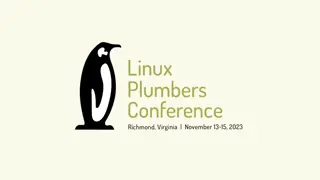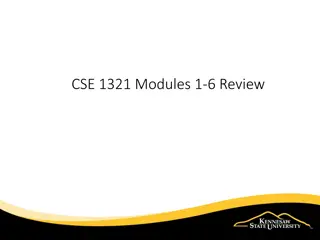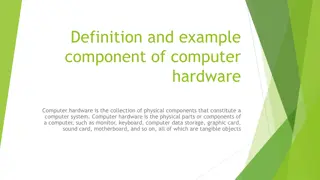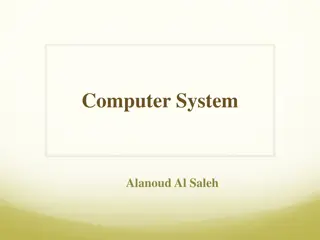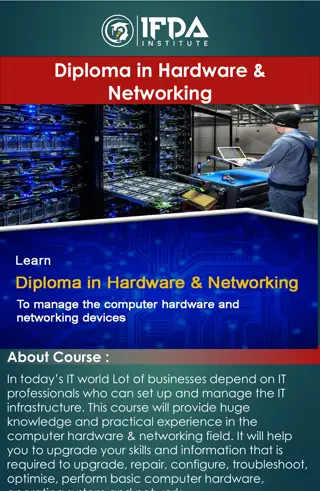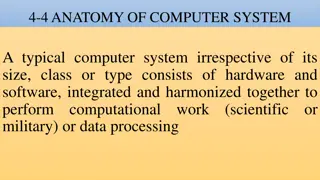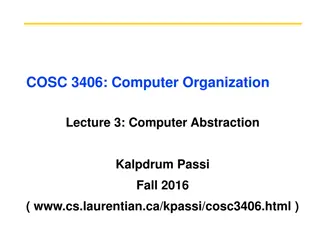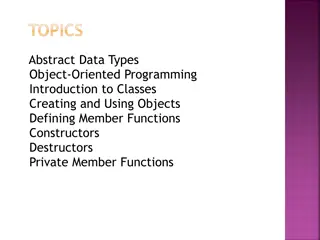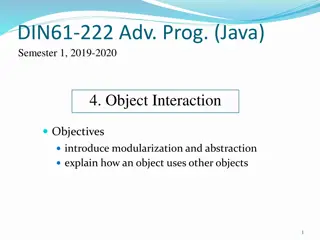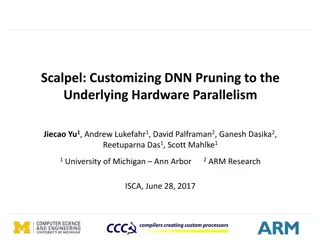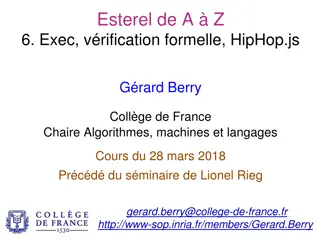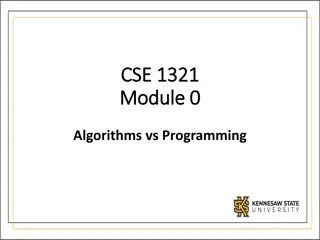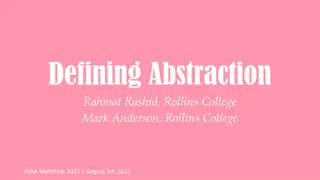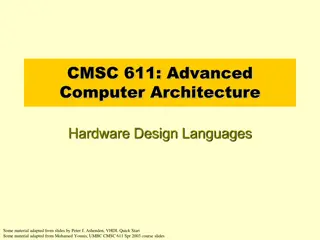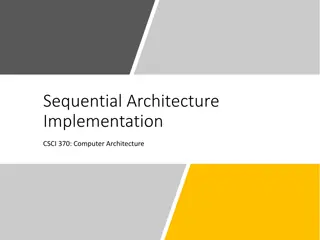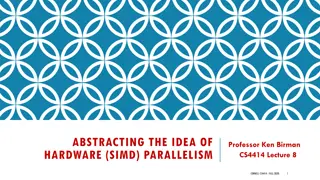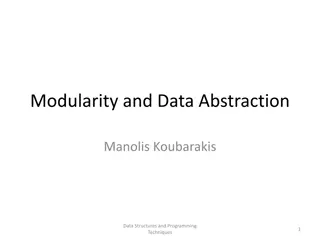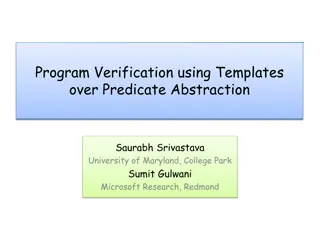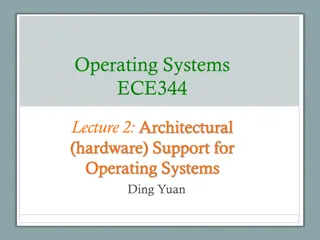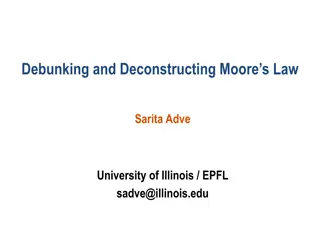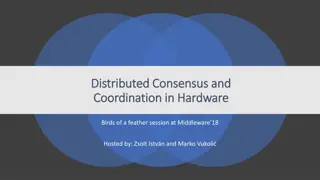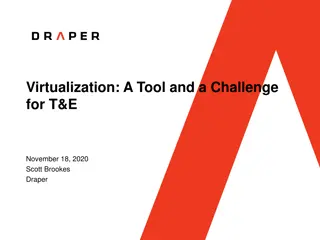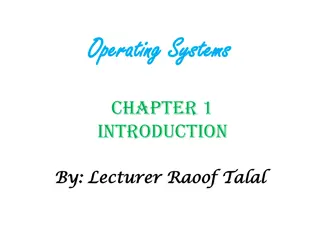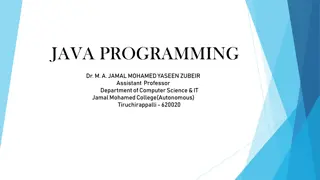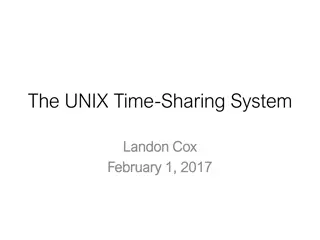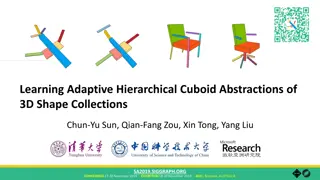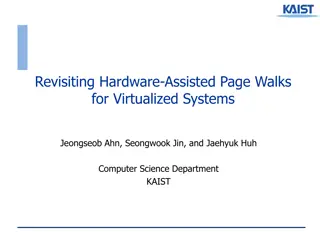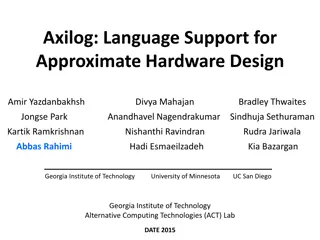Understanding Computer Organization and Architecture
A computer system is a programmable digital electronics device that processes data as per program instructions to provide meaningful output. It comprises hardware and software components, with hardware being the physical parts and software essential for driving the hardware. Computer organization fo
14 views • 71 slides
Understanding Algorithms and Programming Fundamentals
Learn about algorithms, programming, and abstraction in computing. Explore the definition and properties of algorithms, the relationship between algorithms and programming, and the concept of abstraction. Discover how algorithms are like recipes and how abstraction simplifies complex tasks in comput
1 views • 17 slides
Addressing Monitoring Challenges in Hardware Offloading
Exploring the complexities of offloading monitoring tasks in hardware, this content delves into the limitations of current methods such as move_pages and IBS/PEBs-based monitoring. It highlights the need for efficient tracking mechanisms like IDLE-bit and proposes innovative solutions like Transpare
3 views • 17 slides
Hold Down and Release Mechanism Hardware Simulator for Ground Deployment Testing
The project involves developing a hardware simulator for testing a Hold Down and Release Mechanism used in Mars Sample Return missions. The simulator aims to replicate the functionality of expensive flight hardware at a lower cost and with reduced lead time. Key requirements include precise activati
3 views • 8 slides
Network Function Abstraction A delicate question of (CPU) affinity?
Exploring the delicate balance of CPU affinity in network function abstraction, including challenges, benefits, and solutions like CPU pinning for network workloads. Learn about the impact on performance and scalability, as well as the importance of proper configuration in virtual and physical envir
3 views • 40 slides
Understanding Algorithms and Abstraction Concepts in Programming
Exploring algorithms as logical steps to accomplish tasks and abstraction as a way to group concepts for clarity in programming. Dive into flowcharts for sorting algorithms, pseudocode skeletons, and code snippets in various languages like C#, Java, and C++. Learn about handling variables and user i
2 views • 48 slides
Stainless Steel D Rings, O Rings & Weldable D Ring Hardware
Explore our collection of high-quality stainless steel D rings, weldable D rings, and versatile O rings. Ideal for various hardware applications, our rings ensure durability and reliability. Shop now at Buckles International for premium hardware rings.
0 views • 9 slides
Overview of Computer Hardware Components and Software Functions
Computer hardware components such as monitor, CPU, mouse, and projector are essential physical parts of a computer system, while software includes intangible programs like operating systems and utility software. Hardware components perform tasks like displaying data, processing information, and prin
8 views • 9 slides
Understanding Computer Systems: Components and Organization
Computer systems are high-speed electronic machines that process data and instructions through hardware and software components. The elements include hardware, software, and users, with binary systems using bits and bytes to represent data. The organization of a computer involves input, CPU, memory,
1 views • 21 slides
Diploma in Hardware & Networking: Upgrade Your IT Skills
This course provides comprehensive knowledge and practical experience in computer hardware and networking, essential for managing IT infrastructure. Gain expertise in PC hardware maintenance, customer and networking support, and more to pursue a career as a Hardware and Network Engineer. Learn to as
1 views • 8 slides
Anatomy of a Computer System: Hardware Components and Functions
A typical computer system consists of hardware and software working together to perform various computational tasks. The hardware components include the central processing unit (CPU), input/output devices, storage units, and the motherboard. The CPU acts as the main brain of the computer, performing
6 views • 6 slides
Understanding Computer Hardware Components
Computer hardware encompasses the physical components of a computer system that can be touched and felt, such as the motherboard, CPU, RAM, and storage devices like HDD and SSD. Without hardware, essential software cannot run efficiently. This lesson explores the definition, importance, and various
1 views • 6 slides
Understanding Computer Abstraction and Performance Metrics
Computer abstraction, instruction count, CPI, and performance metrics like clock cycles, CPU time, and program execution are crucial concepts in computer organization. Through examples and detailed explanations, this lecture explores how architecture, instruction sets, compilers, and algorithms impa
0 views • 27 slides
Computational Thinking, Algorithms & Programming Overview
This unit covers key concepts in computational thinking, including decomposition, abstraction, and algorithmic thinking. Decomposition involves breaking down complex problems, abstraction focuses on identifying essential elements, and algorithmic thinking is about defining clear instructions to solv
1 views • 5 slides
Introduction to Object-Oriented Programming and Data Abstraction
Introduction to object-oriented programming concepts including classes, objects, member functions, constructors, destructors, and abstract data types. Exploring the principles of abstraction in software development, passing objects to functions, and understanding the limitations of procedural progra
0 views • 47 slides
Understanding Modularization and Abstraction in Object-Oriented Programming
Modularization in programming involves breaking down complex problems into simpler sub-parts, while abstraction allows combining low-level details into higher levels. By using modules and abstract classes, software development becomes more manageable and efficient, especially in object-oriented prog
0 views • 39 slides
Optimizing DNN Pruning for Hardware Efficiency
Customizing deep neural network (DNN) pruning to maximize hardware parallelism can significantly reduce storage and computation costs. Techniques such as weight pruning, node pruning, and utilizing specific hardware types like GPUs are explored to enhance performance. However, drawbacks like increas
0 views • 27 slides
Formal Verification and Automata Abstraction in Esterel
This content delves into the applications of formal verification and automata abstraction in Esterel, focusing on techniques such as verification by abstraction of automata, boolean verification using BDDs, bounded model checking in SAT/SMT, and more. The work of Gérard Berry at the Collège de Fra
0 views • 38 slides
Understanding Algorithms and Programming: A Visual Introduction
Explore the fundamental concepts of algorithms and programming through visual representations and practical examples. Learn about algorithmic thinking, abstraction, recipe-like algorithms, and the importance of logical steps in accomplishing tasks. Discover how algorithms encapsulate data and instru
1 views • 17 slides
Overview of Fly and Trajectory Scans in Data Acquisition
Fly and trajectory scans in data acquisition involve software and hardware options for acquiring data while positioners move at constant speeds. Software fly scans enable periodic data acquisition triggered by software, while hardware fly scans rely on pulses from positioners. Hardware fly choices a
0 views • 14 slides
Satisfiability Modulo Abstraction for Separation Logic with Linked Lists
This study explores the application of satisfiability modulo abstraction in separation logic with linked lists. It presents a technique using abstract interpretation concepts to handle separation logic formulas beyond previous methods, specifically focusing on over-approximating heaps that satisfy t
0 views • 41 slides
Analysis of Data Manager Survey Results in VQI Abstraction
Survey results gathered from 942 notified Data Manager users in VQI abstraction revealed insights on responsibilities, experience levels, backgrounds, and facility types. Responses indicate varying levels of involvement with data collection, team size, and number of facilities managed, providing val
0 views • 27 slides
Exploring Abstraction in Mathematics: Insights from MAA MathFest 2022
Delve into the concept of abstraction with a focus on diverse perspectives, historical influences, pedagogical approaches, and the process of abstraction itself as discussed at MAA MathFest 2022. Engage with enlightening comparisons and references shedding light on this fundamental mathematical prin
0 views • 7 slides
Understanding Portraits: Realism, Abstraction, and Representation
Delve into the world of portraiture with a focus on realism and abstraction, exploring how artists like Cézanne, Vermeer, and Picasso depict their subjects. Learn the significance of portraits, the difference between realistic and abstract art, and the impact of color on portraying emotions and pro
0 views • 7 slides
Understanding Hardware Design Languages in Advanced Computer Architecture
This material covers topics like behavioral correctness, timing simulations, domains, and levels of modeling in hardware design languages. It discusses functional and structural modeling, as well as the use of simulators to analyze and verify system behavior. Hardware Design Languages, behavioral de
0 views • 38 slides
Understanding Y86-64 Instruction Set and Hardware Control Language
Delve into the Y86-64 instruction set architecture, exploring sequential architecture implementations for computer architecture. Uncover the various instruction sets and their functionalities, such as halt, nop, call, ret, and more. Additionally, discover the building blocks of hardware, including A
0 views • 51 slides
Exploring Hardware SIMD Parallelism Abstraction
Understanding the inherent parallelism in applications can lead to high performance with less effort, but the alignment with how Linux and C++ compilers discover parallelism is crucial. The shift towards making parallel computing more mainstream highlights the importance of SIMD operations and oppor
0 views • 50 slides
Understanding Modularity and Data Abstraction in Programming
Learn about the importance of procedural abstraction, information hiding, modules, and abstract datatypes in programming. Discover how these concepts help in structuring large programs, improving maintainability, and enhancing data organization and operation control.
0 views • 56 slides
Program Verification Using Templates Over Predicate Abstraction
This research explores a technique that allows for inferring invariants with arbitrary quantification and boolean structure, improving the state-of-the-art in program verification. It can infer weakest preconditions, helping with debugging and analysis by discovering worst-case inputs and missing pr
0 views • 32 slides
Architectural Hardware Support for Operating Systems in ECE344 Lecture
The lecture discusses the importance of hardware support in operating systems, emphasizing the management of hardware resources and providing a clear interface to programs. It explores the fundamental relationship between operating system functionality and hardware, highlighting how hardware support
0 views • 53 slides
Exploring the Evolution and Future of Computing: Moore's Law Debunked
Dive into the critical analysis of Moore's Law and Dennard Scaling by Sarita Adve from the University of Illinois, uncovering the shift towards a new era focused on doing more with less in computing hardware and software abstraction. Discover the concept of "Less Law of Computing" and the emphasis o
0 views • 7 slides
Distributed Consensus and Coordination in Hardware Birds of a Feather Session
Specialists in distributed consensus and hardware coordination gathered at Middleware 18 for a session hosted by Zsolt István and Marko Vukoli. The session covered topics such as specialized hardware, programmable switches and NICs, P4 language for expressing forwarding rules, and deployment exampl
0 views • 33 slides
Understanding Virtualization: Hardware Abstraction and Hypervisor Concepts
Dive into the world of virtualization with a focus on hardware abstraction and hypervisor technology. Explore the definitions and examples of hardware virtualization, hypervisors, and hardware abstraction, shedding light on how they enable multiple operating systems to coexist on a single physical m
0 views • 21 slides
Understanding Operating Systems: An Introduction and Overview
An operating system is a crucial program that manages computer hardware and serves as an intermediary between users and hardware. This chapter explores the role of operating systems in a computer system, covering components like hardware, application programs, and users. It delves into how operating
0 views • 16 slides
Fundamentals of Object-Oriented Programming in Java
Object-Oriented Programming (OOP) is a methodology that simplifies software development by using classes and objects. This paradigm includes concepts like Object, Class, Inheritance, Polymorphism, Abstraction, and Encapsulation. Other terms used in OOP design include Coupling, Cohesion, Association,
0 views • 54 slides
Evolution of Data Abstraction in Operating Systems
Explore the evolution of central data abstraction in operating systems from the complexity of Multics to the simplicity and elegance of Unix. Discover how files are managed in Unix, the tradeoffs in data-sharing methods, and the impacts on efficiency and protection.
0 views • 41 slides
Innovative 3D Shape Abstraction Research at SIGGRAPH 2019
Explore the cutting-edge research on adaptive hierarchical cuboid abstractions and 3D shape structures presented at SIGGRAPH 2019. The goal is to construct a good 3D abstraction for shapes, focusing on compactness, expressiveness, adaptiveness, and consistency.
0 views • 56 slides
Hardware-Assisted Page Walks for Virtualized Systems
Virtualization in cloud computing and server consolidation relies on hardware-assisted page walks for address translation in virtualized systems. This involves two-level address translations to ensure isolated address spaces for each virtual machine, utilizing multi-level page tables to manage memor
0 views • 32 slides
Approximate Computing in Hardware Design: A Comprehensive Overview
Explore the groundbreaking concepts of approximate computing in hardware design, which involves embracing errors to enhance resource efficiency and performance. Delve into topics such as avoiding worst-case design, criteria for approximate HDL, safety in hardware, and relaxing accuracy requirements
0 views • 31 slides
Understanding Game Abstraction and Equilibrium
Extensive-Form Game Abstraction with Bounds delves into the complexities of game abstraction, exploring theoretical guarantees, algorithmic challenges, and equilibrium-finding processes. The difficulty of game abstraction is examined, highlighting issues such as pathologies and the struggle to optim
0 views • 22 slides


